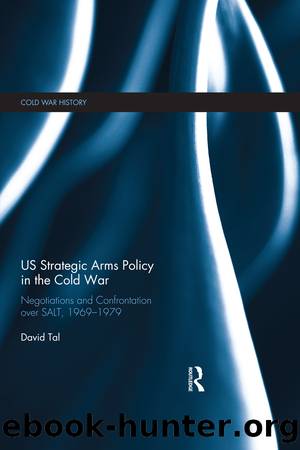Us Strategic Arms Policy in the Cold War: Negotiation and Confrontation Over Salt, 1969-1979 by David Tal

Author:David Tal [Tal, David]
Language: eng
Format: epub
Tags: International Relations, Modern, 20th Century, Political Science, Arms Control, History, Security (National & International), General
ISBN: 9781351802659
Google: _0AlDwAAQBAJ
Goodreads: 35140736
Publisher: Routledge
Published: 2017-05-08T00:00:00+00:00
Preparing a summit
Despite Nixonâsâ assurances on various occasions that he would not sacrifice US interests to achieve SALT in order to save his position, and despite Schlesingerâs awkward reaction to Nixonâs reprimand, it seemed as if with the summit coming closer and closer, the Pentagon was more and more concerned that the president would do just that. Even if he did not say that explicitly, it was with this thought in his mind that Schlesinger set up a SALT task force in July that would ensure that â[d]efense policy toward the talks were formulated in a systematic way.â60 Kissinger was, of course, aware too of the fear that Nixon and he would do anything to get a SALT agreement as a way to extract the president from the Watergate quagmire, and he fiercely rejected the charges that the president was âselling out to the Russians.â At the Verification Panel meeting on April 23 he explained that, in fact, a SALT agreement could hurt the president politically, as it would alienate his traditional political base. The only reason the president wanted the agreement was to maintain the good relations with the Soviet Union.61 Kissinger repeated the point in a conversation he had with Schlesinger. âA SALT agreement is not good politically for the President,â emphasized Kissinger to Schlesinger. âHe will infuriate the conservatives and not gain the liberals.â So why the summit, wondered Schlesinger. âBecause we canât piss away the Soviet relationship,â answered Kissinger gloomily. âSALT only hurts the president. But we need to respond to Brezhnev.â62 That, of course, was not completely true, as Nixon and Kissinger assumed that a SALT agreement would be of strategic value to the United States, but it would also benefit the president politically. At the same time, while it is not clear if Kissinger really believed that SALT could hurt the president, he did start to assume that the president could hurt SALT. Kissinger suspected that the Soviets were toughening their position on SALT because of Nixonâs deteriorating political position, hoping that the president would be ready to pay a higher price for an agreement.63
With the presidentâs hands tied, and Schlesinger and the JCS seemingly indifferent to the future of SALT, Kissinger was almost the only one who was ready to fight for SALT. In fact, sometimes it looked as if Kissinger turned SALT from a means to an end, pushing ahead against all the odds. He was seeking ways to close two gaps, one between his ideas, which were based on more MIRVed missiles to the US and more ICBMs to the Soviets, and the Pentagonâs, which were based on equality in the aggregate number of ICBMs, SLBMs and bombers â for both sides, without caring about the MIRV. The second gap Kissinger sought to close was with the Soviet Union, where he wished to give the United States a larger number of MIRVed missiles than the Soviet Union. He discussed the issue with Dobrynin, during which he made an interesting observation. Dobrynin thought that the gap Kissinger was suggesting in favor of the United States was too high.
Download
This site does not store any files on its server. We only index and link to content provided by other sites. Please contact the content providers to delete copyright contents if any and email us, we'll remove relevant links or contents immediately.
Spell It Out by David Crystal(35852)
Life for Me Ain't Been No Crystal Stair by Susan Sheehan(35539)
Cecilia; Or, Memoirs of an Heiress — Volume 1 by Fanny Burney(32073)
Cecilia; Or, Memoirs of an Heiress — Volume 3 by Fanny Burney(31468)
Cecilia; Or, Memoirs of an Heiress — Volume 2 by Fanny Burney(31418)
The Great Music City by Andrea Baker(30795)
Professional Troublemaker by Luvvie Ajayi Jones(29425)
We're Going to Need More Wine by Gabrielle Union(18641)
Twilight of the Idols With the Antichrist and Ecce Homo by Friedrich Nietzsche(18305)
The Secret History by Donna Tartt(18208)
All the Missing Girls by Megan Miranda(14784)
Cat's cradle by Kurt Vonnegut(14775)
Pimp by Iceberg Slim(13797)
Bombshells: Glamour Girls of a Lifetime by Sullivan Steve(13698)
Fifty Shades Freed by E L James(12923)
Talking to Strangers by Malcolm Gladwell(12888)
Norse Mythology by Gaiman Neil(12858)
The Social Justice Warrior Handbook by Lisa De Pasquale(11957)
Underground: A Human History of the Worlds Beneath Our Feet by Will Hunt(11846)
